商务礼仪常识
商务礼仪基本常识

商务礼仪基本常识一、和外国人就餐“三不准”:一是不能当众修饰自己;二是不能为对方劝酒夹菜,不能强迫别人吃;三是进餐时不能发出声音。
二、就餐或开会时的点名方式:正确的方式是,手心向上“一位”、“二位”、“三位”地点名,而不能手心向下或用手指指点点。
因为,手心向下是傲慢的意思;用手指点则带有训斥的味道。
三、女士穿职业裙装“五不准”:一是绝对不能穿黑色皮裙,这是国际惯例,给人的感觉是不正经;二是在正式的场合不能光腿,因为不好看,再说如果脚上面有点小毛病的话,就更不美观了;三是不能出现残破。
远看头、近看脚、不远不近看中腰;四是穿套裙不能穿便鞋,与袜子要配套,穿凉鞋不穿袜子,穿正装时可以穿前不露脚趾后不露脚跟的凉鞋;五是头发不能过长,不能随意披散开,头发长可以盘起来,束起来,不要染色。
四、女人看头、男人看腰中“男人看腰”是什么意思:男人看腰指的是,在正式的场合,男人的腰上不能挂东西。
五、男士穿西装的“三色原则”、“三一定律”和“三大禁忌”:1、三色原则:含义是全身的颜色限制在三种颜色以内,三种颜色指的是三大色系;2、三一定律:是讲身上的三个部位:鞋子、腰带和公文包,这三个地方要是一个颜色,一般以黑色为主;3、三大禁忌:第一个禁忌,是商标必须拆掉;第二个禁忌,是袜子的问题,指的是袜子的色彩、质地,正式的场合不穿尼龙丝袜,不穿白色的袜子,袜子的颜色要以与鞋子的颜色一致或其他深色的袜子为佳;第三个禁忌,是指领带问题,主要是指质地和颜色的要求。
穿非职业装和短袖装时不打领带,穿夹克不打领带。
领带长度,是以领带箭头在皮带扣的上沿为宜。
六、什么叫“接待有三声”:也就是说在接待中有三句话要讲,一是来有迎声,就是要主动打招呼;二是问有答声;三是去有送声。
七、什么是文明五句:第一句话是问候语“您好”;第二句话是请求语“请”;第三句话是感谢语“谢谢”;第四句话是抱歉语“对不起”;第五句话是道别语“再见”。
八、什么是热情三到:1、眼到——眼看眼,不然的话,你的礼貌别人是感觉不到的。
商务会面礼仪常识

商务会面礼仪常识会面需要注意很多的礼仪,好的礼仪能体现你的素养。
那么大家知道商务会面礼仪常识吗?商务会面礼仪常识一、握手礼仪1.握手礼仪是否握手讲究位尊者有决定权,即由位尊者决定双方是否有握手的必要。
在不同场合,位尊者的含义不同。
在商务场合中,位尊者的判断顺序为职位主宾年龄性别婚否。
上下级关系中,上级应先伸手,以表示对下级的亲和与关怀;主宾关系中,主人宜先伸手以表示对客人的欢迎;根据年龄判断时,年长者应主动伸手以表示对年轻同事的欣赏和关爱;根据性别判断时,女性宜主动伸手,以表示大方、干练的职业形象;根据婚姻情况做出判断时,已婚者应向未婚者先伸手以表示友好。
在纯粹的社交场合,判断顺序有所不同,应以性别主宾年龄婚否职位作为位尊者的判断顺序。
关系密切的朋友之间,有时以谁先伸手表示更加热情的期待和诚意。
在送别客人时,应由客人先伸手告别,避免由主人先伸手而产生逐客之嫌。
2.握手细节1、身体姿势无论在哪种场合,无论双方的职位或年龄相差有多大,都必须起身站直后再握手,坐着握手是不合乎礼仪的。
握手时上身应自然前倾,行15度欠身礼。
手臂抬起的高度应适中。
2、手势握手时必须用右手,即便是习惯使用左手的人也必须用右手来握手,这是国际上普遍适用的原则。
握手时伸出的手掌应垂直于地面,手心向下或向上均不合适。
握手时应掌心相握,这样才符合真诚、友好的原则。
很多男士在与女士握手时只握四指,以示尊重和矜持,但在男女平等的今天,这种握手方式已不符合礼仪规范。
尤其在商务活动中,性别被放在次要的位置,女性更应主动、大方地与男士进行平等、友好的握手,以便进一步进行平等互利的商务交流。
3、时间握手的时间不宜过长或过短,两手交握3~4秒,上下晃动最多2次是较为合适的。
一触即把手收回,有失大方;握着他人的手不放则会引起对方的尴尬。
4、力度握手的力度能够反映出人的性格。
太大的力度会显得人鲁莽有余、稳重不足;力度太小又显得有气无力、缺乏生机。
因此,建议握手的力度把握在使对方感觉到自己稍加用力即可。
商务礼仪常识

商务礼仪常识商务礼仪是指在商务场合下,遵循一定的规范和行为准则,以提升人际关系、加强合作关系并取得商业成功的一种素质和技巧。
商务礼仪的常识包括以下几个方面:1.仪表端庄:在商务场合中,仪表端庄、穿着得体是很重要的。
男士应穿西装、皮鞋,女士应穿裙装或西装,妆容要淡雅大方,发型整洁。
2.言谈举止:商务场合中,言辞要得体、礼貌,语气要温和,避免过于直接的措辞。
说话要注意声音的大小和语速的快慢,避免过于喧闹或讲话过快。
3.交际礼仪:商务交际中的礼仪需要注意。
例如在与客户交谈时要注意维持适当的眼神接触,握手时要用力适中,不可过轻或过紧,招待客户时要让客户坐在主位上。
4.礼仪用语:在商务礼仪中,使用适当的礼貌用语是必要的。
例如对客户道别时要使用合适的礼节用语,如“再见”、“谢谢”等。
5.礼品馈赠:在商务场合中,馈赠礼品有时是必要的。
在选择礼品时要考虑到对方的身份、职位和文化背景。
一般来说,商务场合下送礼应选择实用性强的礼品,如名片夹、笔记本等。
在商务礼仪中,礼品的馈赠是一种常见的方式。
以下是一些关于商务礼品馈赠的注意事项:1.选择合适的礼品:要根据收礼人的喜好、背景和文化差异来选择合适的礼品。
尽量选择实用性较强的礼品,如文具、手表等。
避免选择过于个人化或有争议的礼品。
2.包装精美:礼品的包装要精美,注重细节,给人以美好的印象。
可以选择专业的礼品包装服务,或者自行购买精美的礼品盒进行包装。
3.礼品的送达方式:根据具体情况选择适当的送达方式。
可以直接送到对方公司,或者通过快递等方式送达。
无论选择何种方式,都要事先和对方确认好时间和地址。
4.礼品的搭配附言:在送礼时可以附带一张精美的贺卡,并在贺卡上写上简短的祝福语或感谢话语,表达对对方的谢意和良好祝福。
5.注意礼品的价值和数量:礼品的价值要适度,既不可过于奢华,也不可太过廉价。
同时要注意礼品的数量,不可过多或过少。
总之,商务礼仪是商务场合下必须遵守的规范和准则,通过正确的行为和礼仪技巧,可以提升商业合作关系并取得商业成功。
商务拜访中的礼仪常识
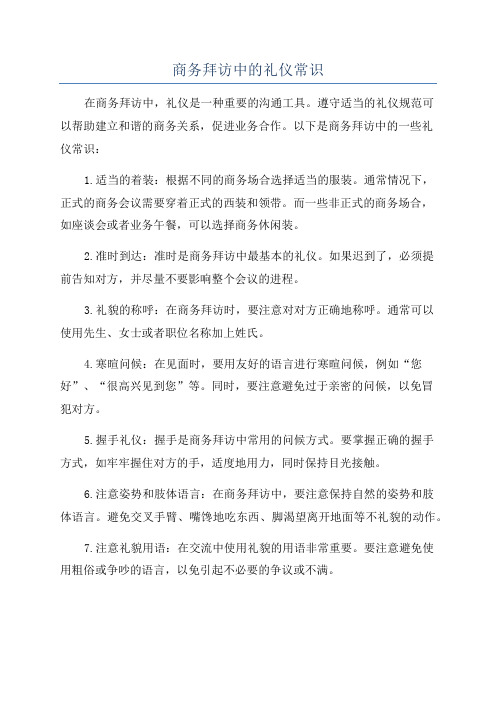
商务拜访中的礼仪常识在商务拜访中,礼仪是一种重要的沟通工具。
遵守适当的礼仪规范可以帮助建立和谐的商务关系,促进业务合作。
以下是商务拜访中的一些礼仪常识:1.适当的着装:根据不同的商务场合选择适当的服装。
通常情况下,正式的商务会议需要穿着正式的西装和领带。
而一些非正式的商务场合,如座谈会或者业务午餐,可以选择商务休闲装。
2.准时到达:准时是商务拜访中最基本的礼仪。
如果迟到了,必须提前告知对方,并尽量不要影响整个会议的进程。
3.礼貌的称呼:在商务拜访时,要注意对对方正确地称呼。
通常可以使用先生、女士或者职位名称加上姓氏。
4.寒暄问候:在见面时,要用友好的语言进行寒暄问候,例如“您好”、“很高兴见到您”等。
同时,要注意避免过于亲密的问候,以免冒犯对方。
5.握手礼仪:握手是商务拜访中常用的问候方式。
要掌握正确的握手方式,如牢牢握住对方的手,适度地用力,同时保持目光接触。
6.注意姿势和肢体语言:在商务拜访中,要注意保持自然的姿势和肢体语言。
避免交叉手臂、嘴馋地吃东西、脚渴望离开地面等不礼貌的动作。
7.注意礼貌用语:在交流中使用礼貌的用语非常重要。
要注意避免使用粗俗或争吵的语言,以免引起不必要的争议或不满。
8.具备基本的礼仪常识:在商务拜访中,需要具备一些基本的礼仪常识,如用餐礼仪和酒桌礼仪。
在用餐时,要注意使用正确的餐具和举止,尽量避免说话的同时吃东西。
9.尊重对方文化:在国际商务拜访中,要尊重对方的文化和风俗习惯。
事先了解对方的文化差异,避免出现冒犯或失礼的行为。
10.感谢与回访:商务拜访结束后,应当对对方的接待表示感谢,并表示期待下次合作。
如果对方也来过你的公司进行拜访,你可以在适当的时间回访,这样能够增进双方的合作关系。
总之,商务拜访的礼仪常识是建立和谐商务关系的基础。
要积极学习和应用这些礼仪规范,以提升自己的商务素养,并有效推动商务合作的发展。
商务聚餐礼仪常识
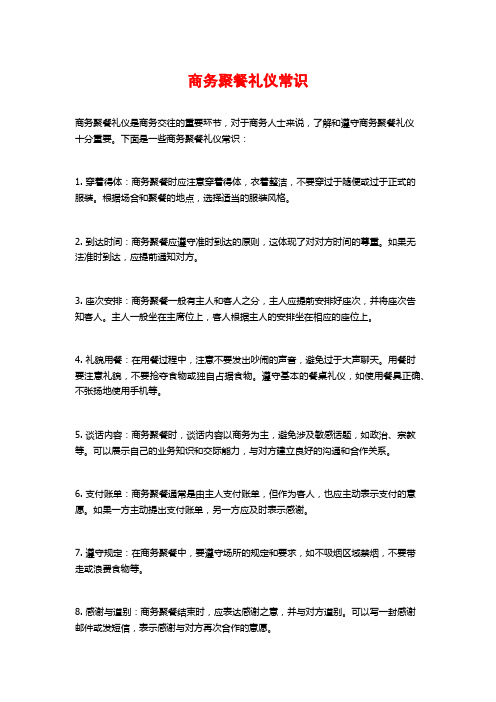
商务聚餐礼仪常识商务聚餐礼仪是商务交往的重要环节,对于商务人士来说,了解和遵守商务聚餐礼仪十分重要。
下面是一些商务聚餐礼仪常识:1. 穿着得体:商务聚餐时应注意穿着得体,衣着整洁,不要穿过于随便或过于正式的服装。
根据场合和聚餐的地点,选择适当的服装风格。
2. 到达时间:商务聚餐应遵守准时到达的原则,这体现了对对方时间的尊重。
如果无法准时到达,应提前通知对方。
3. 座次安排:商务聚餐一般有主人和客人之分,主人应提前安排好座次,并将座次告知客人。
主人一般坐在主席位上,客人根据主人的安排坐在相应的座位上。
4. 礼貌用餐:在用餐过程中,注意不要发出吵闹的声音,避免过于大声聊天。
用餐时要注意礼貌,不要抢夺食物或独自占据食物。
遵守基本的餐桌礼仪,如使用餐具正确、不张扬地使用手机等。
5. 谈话内容:商务聚餐时,谈话内容以商务为主,避免涉及敏感话题,如政治、宗教等。
可以展示自己的业务知识和交际能力,与对方建立良好的沟通和合作关系。
6. 支付账单:商务聚餐通常是由主人支付账单,但作为客人,也应主动表示支付的意愿。
如果一方主动提出支付账单,另一方应及时表示感谢。
7. 遵守规定:在商务聚餐中,要遵守场所的规定和要求,如不吸烟区域禁烟,不要带走或浪费食物等。
8. 感谢与道别:商务聚餐结束时,应表达感谢之意,并与对方道别。
可以写一封感谢邮件或发短信,表示感谢与对方再次合作的意愿。
以上是商务聚餐礼仪常识的一些重要内容,在商务聚餐中,礼仪的重要性不可忽视,它可以展示出一个人的素质和修养,对于商务人士来说尤为重要。
2023年商务礼仪常识

2023年商务礼仪常识2023年商务礼仪常识1自我介绍一、公务交往中的介绍问题介绍有两种:第一种---自我介绍;第二种---介绍他人。
1.自我介绍有四个要点需要注意。
A.最好是先递名片再介绍。
交换名片时有个时机的问题,一见面就把名片递过去,再重复下自己的名字。
B.自我介绍时间要简短,愈短愈好。
一般自我介绍半分钟以内就完全可以结束了,训练有素。
C.内容要全面。
自我介绍一般包括四个内容:单位、部门、职务、姓名。
要训练有素,一气呵成。
D.倘若单位和部门头衔较长的话,第一次介绍的时候使用全称,后面才可以改简称。
所以在国际交往中,用字母来做简称,或者以中文来做简称,一定要注意,先讲全称,再讲简称,否则容易南辕北辙。
2.介绍别人比较重要的是谁当介绍人?社交场合的惯例,介绍人一般应该是女主人。
在国际交往中介绍人一般是三种人。
第一种是专业对口人员。
第二种是公关礼宾人员。
第三如果对方是贵宾的话,礼仪上讲身份对等,就是在场的人里职务最高的。
递名片的礼节人际交往中,名片不但能推销自己,也能很快地助你与对方熟悉,它就像持有着的颜面,不但要很好地珍惜,而且要懂得怎样去使用它。
现代名片是一种经过设计、能表示自己身份、便于交往和开展工作的卡片,名片不仅可以用作自我介绍,而且还可用作祝贺、答谢、拜访、慰问、赠礼附言、备忘、访客留话等。
名片使用在国际交往中,没有名片的人,将被视为没有社会地位的人。
一个不随身携带名片的人,是个不懂得尊重别人的人。
名片不仅要有,而且要带着。
在外国的企业公司,员工这个名片放在什么地方都有讲究,一般放在专用名片包里,或放在西装上衣口袋里,不能乱放。
名片在制作上,讲三个不。
第一个不:名片不随意涂改。
在国际交往中,名片譬如脸面,脸面是不改的;第二个不:提供私宅电话。
涉外礼仪讲究保护个人隐私;第三个不:名片制作,不提供两个以上的头衔。
倘若一个名片上给的头衔越多,有三心二意、用心不专、蒙人之嫌。
所以很多外国人,他身上会有好几种名片,对不同的交往对象,使用的不同名片。
商务礼仪基本常识
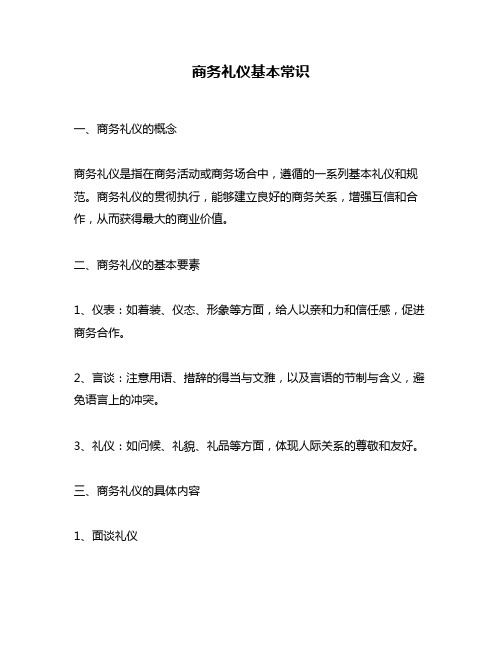
商务礼仪基本常识一、商务礼仪的概念商务礼仪是指在商务活动或商务场合中,遵循的一系列基本礼仪和规范。
商务礼仪的贯彻执行,能够建立良好的商务关系,增强互信和合作,从而获得最大的商业价值。
二、商务礼仪的基本要素1、仪表:如着装、仪态、形象等方面,给人以亲和力和信任感,促进商务合作。
2、言谈:注意用语、措辞的得当与文雅,以及言语的节制与含义,避免语言上的冲突。
3、礼仪:如问候、礼貌、礼品等方面,体现人际关系的尊敬和友好。
三、商务礼仪的具体内容1、面谈礼仪1.1、通常在商务面谈中,重要的座位是靠近门和窗户的位置,也应该让访问方的人坐在靠窗的位置。
1.2、交谈时,保持微笑,让对方感到轻松愉快,可以让会谈更加顺利。
1.3、注意说话的音量,控制在适当的范围内,不大不小。
2、名片礼仪2.1、在交换名片时,应该在对方面前自然地站立,递出名片时应该面对对方递出。
2.2、接受到名片后,可以点头或者轻轻地说“谢谢”,并且应该认真地看一下名片上的信息。
3、用餐礼仪3.1、在用餐时应该保持食物的整洁,尽量不发出任何声响。
3.2、不要谈论与食物无关的话题,以免影响气氛。
3.3、结束用餐时,礼貌地询问对方是否需要帮助。
四、商务礼仪的重要性1、建立好的商务关系商务礼仪能够创造友好的氛围,帮助交流双方建立良好的商业关系。
2、维持商务关系商务礼仪不仅能够帮助建立商业关系,还能够维持和巩固商业关系。
3、提高商业价值商业价值是指商业行为中获得的收益。
商务礼仪的贯彻执行,能够为企业创造更高的商业价值,提高商业竞争力。
总结:在商务活动中,商务礼仪的重要性不言而喻。
只有在遵循良好的商务礼仪基本常识的情况下,才能更好地展示企业的形象,提高商业价值。
因此,对于商务人士来说,更要加强商务礼仪的学习和实践,提高自己的综合素质,从而更好地经营商业关系。
中国商务礼仪常识
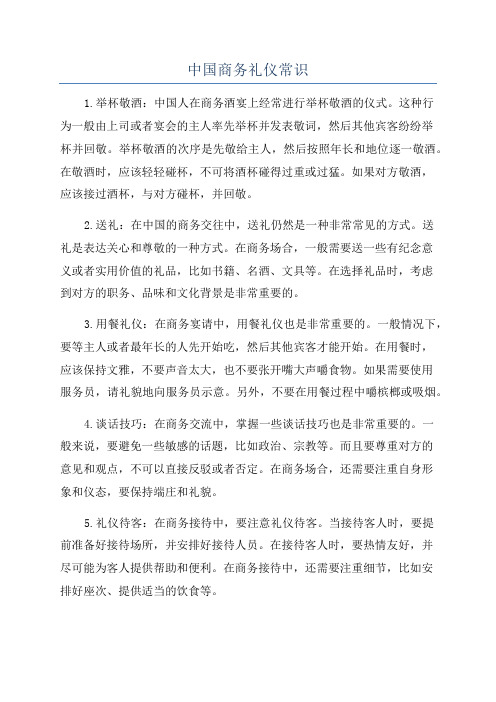
中国商务礼仪常识1.举杯敬酒:中国人在商务酒宴上经常进行举杯敬酒的仪式。
这种行为一般由上司或者宴会的主人率先举杯并发表敬词,然后其他宾客纷纷举杯并回敬。
举杯敬酒的次序是先敬给主人,然后按照年长和地位逐一敬酒。
在敬酒时,应该轻轻碰杯,不可将酒杯碰得过重或过猛。
如果对方敬酒,应该接过酒杯,与对方碰杯,并回敬。
2.送礼:在中国的商务交往中,送礼仍然是一种非常常见的方式。
送礼是表达关心和尊敬的一种方式。
在商务场合,一般需要送一些有纪念意义或者实用价值的礼品,比如书籍、名酒、文具等。
在选择礼品时,考虑到对方的职务、品味和文化背景是非常重要的。
3.用餐礼仪:在商务宴请中,用餐礼仪也是非常重要的。
一般情况下,要等主人或者最年长的人先开始吃,然后其他宾客才能开始。
在用餐时,应该保持文雅,不要声音太大,也不要张开嘴大声嚼食物。
如果需要使用服务员,请礼貌地向服务员示意。
另外,不要在用餐过程中嚼槟榔或吸烟。
4.谈话技巧:在商务交流中,掌握一些谈话技巧也是非常重要的。
一般来说,要避免一些敏感的话题,比如政治、宗教等。
而且要尊重对方的意见和观点,不可以直接反驳或者否定。
在商务场合,还需要注重自身形象和仪态,要保持端庄和礼貌。
5.礼仪待客:在商务接待中,要注意礼仪待客。
当接待客人时,要提前准备好接待场所,并安排好接待人员。
在接待客人时,要热情友好,并尽可能为客人提供帮助和便利。
在商务接待中,还需要注重细节,比如安排好座次、提供适当的饮食等。
6.商务名片的交换:在中国的商业文化中,交换名片是一个非常重要的环节。
在交换名片时,要用两只手递上自己的名片,并在接受别人名片时也要用两只手接过来。
接受到名片后,应该细心地查看对方的名片,并表示感兴趣。
以上是中国商务礼仪的一些常识。
在商务交往中,掌握这些礼仪常识可以帮助提升个人形象,并加强商务关系的发展。
商务礼仪常识8篇
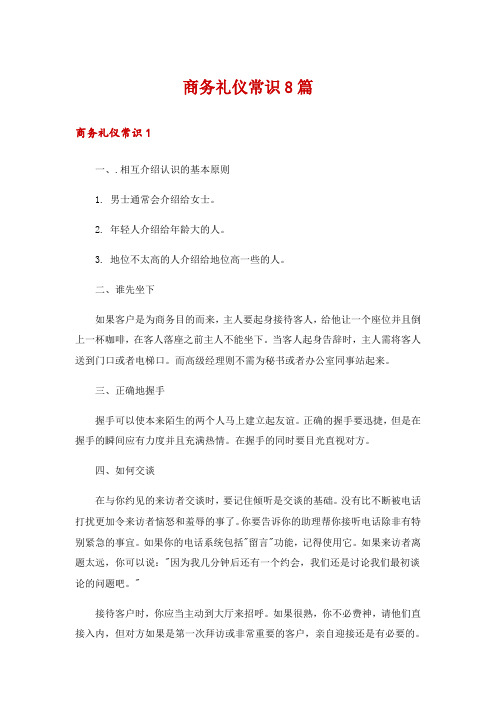
商务礼仪常识8篇商务礼仪常识1一、.相互介绍认识的基本原则1. 男士通常会介绍给女士。
2. 年轻人介绍给年龄大的人。
3. 地位不太高的人介绍给地位高一些的人。
二、谁先坐下如果客户是为商务目的而来,主人要起身接待客人,给他让一个座位并且倒上一杯咖啡,在客人落座之前主人不能坐下。
当客人起身告辞时,主人需将客人送到门口或者电梯口。
而高级经理则不需为秘书或者办公室同事站起来。
三、正确地握手握手可以使本来陌生的两个人马上建立起友谊。
正确的握手要迅捷,但是在握手的瞬间应有力度并且充满热情。
在握手的同时要目光直视对方。
四、如何交谈在与你约见的来访者交谈时,要记住倾听是交谈的基础。
没有比不断被电话打扰更加令来访者恼怒和羞辱的事了。
你要告诉你的助理帮你接听电话除非有特别紧急的事宜。
如果你的电话系统包括"留言"功能,记得使用它。
如果来访者离题太远,你可以说:"因为我几分钟后还有一个约会,我们还是讨论我们最初谈论的问题吧。
"接待客户时,你应当主动到大厅来招呼。
如果很熟,你不必费神,请他们直接入内,但对方如果是第一次拜访或非常重要的客户,亲自迎接还是有必要的。
请以专业化形象出现在柜台前,但别像演戏一样夸张;虽不似舞台剧夸张,但却一样重要。
当你进入接待客户室时,一定有人在观察你,他们会从你的外表、姿势、动作及其他肢体语言来判断你,他们对你的第一感觉即代表你的公司给人的形象。
假如你表现得很谦卑、神经质、胆怯、缩手缩脚,在你还没有说话之前,你已输掉了半截。
确信你的姿势、面部表情甚至肢体语言都充满自信,让人觉得你够专业化。
不要轻易泄露出自己的感情或是让失望感压迫你。
如果你以负面的态度接待客户,相信对方将给予相同的回应。
一、替上级会客见面后主动向客人自我介绍,如果你是秘书,你可以告诉他:“你早,,我是__,是张经理的助理。
”如果没递上名片,但可能已有准备并已拿在手上,请你毫不迟疑地向他索取名片。
商务酒桌礼仪常识
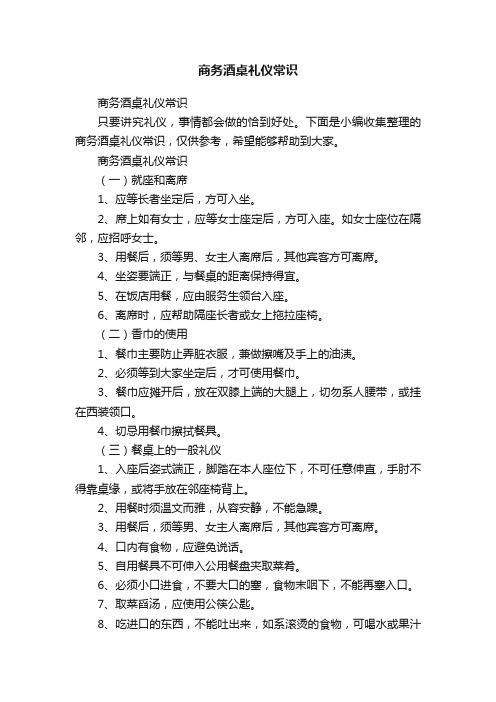
商务酒桌礼仪常识商务酒桌礼仪常识只要讲究礼仪,事情都会做的恰到好处。
下面是小编收集整理的商务酒桌礼仪常识,仅供参考,希望能够帮助到大家。
商务酒桌礼仪常识(一)就座和离席1、应等长者坐定后,方可入坐。
2、席上如有女士,应等女士座定后,方可入座。
如女士座位在隔邻,应招呼女士。
3、用餐后,须等男、女主人离席后,其他宾客方可离席。
4、坐姿要端正,与餐桌的距离保持得宜。
5、在饭店用餐,应由服务生领台入座。
6、离席时,应帮助隔座长者或女上拖拉座椅。
(二)香巾的使用1、餐巾主要防止弄脏衣服,兼做擦嘴及手上的油渍。
2、必须等到大家坐定后,才可使用餐巾。
3、餐巾应摊开后,放在双膝上端的大腿上,切勿系人腰带,或挂在西装领口。
4、切忌用餐巾擦拭餐具。
(三)餐桌上的一般礼仪1、入座后姿式端正,脚踏在本人座位下,不可任意伸直,手肘不得靠桌缘,或将手放在邻座椅背上。
2、用餐时须温文而雅,从容安静,不能急躁。
3、用餐后,须等男、女主人离席后,其他宾客方可离席。
4、口内有食物,应避免说话。
5、自用餐具不可伸入公用餐盘夹取菜肴。
6、必须小口进食,不要大口的塞,食物末咽下,不能再塞入口。
7、取菜舀汤,应使用公筷公匙。
8、吃进口的东西,不能吐出来,如系滚烫的食物,可喝水或果汁冲凉。
9、送食物入口时,两肘应向内靠,不直向两旁张开,碰及邻座。
10、自己手上持刀叉,或他人在咀嚼食物时,均应避免跟人说话或敬酒。
11、好的吃相是食物就口,不可将口就食物。
食物带计,不能匆忙送入口,否则汤汁滴在桌布上,极为不雅。
12、切忌用手指掏牙,应用牙签,并以手或手帕遮掩。
13、避免在餐桌上咳嗽、打喷嚏、呕气。
万一不禁,应说声“对不起”。
14、喝酒宜各随意,敬酒以礼到为止,切忌劝酒、猜拳、吆喝。
15、如餐具坠地,可请侍者拾起。
16、遇有意外,如不慎将酒、水、汤计溅到他人衣服,表示歉意即可,不必恐慌赔罪,反使对方难为情。
17、如欲取用摆在同桌其他客人面前之调味品,应请邻座客人帮忙传递,不可伸手横越,长驱取物。
商务礼仪常识及注意事项

商务礼仪常识及注意事项商务礼仪是在商业活动中礼仪规范的一种表现形式,它是以商务行为为依托,通过一定方式和形式来规范商务活动中的人际交往和沟通。
遵守商务礼仪对于建立良好的商业形象、加强商务合作、促进商业交流具有重要意义。
以下是商务礼仪的一些常识和注意事项。
一、着装礼仪1.根据场合选择合适的着装:商务活动场合通常要求穿着正式、得体。
如有特殊要求,也可以根据场合进行着装。
2.保持整洁和干净:穿着整洁和干净是商务礼仪的基本要求,这能够给人留下良好的第一印象。
3.注意颜色的搭配:颜色的选择和搭配要符合商务礼仪的要求。
一般来说,深色调和中性色调较为常用和稳重。
二、言谈礼仪1.注意言辞的文雅:在商务活动中,要尽量使用文雅、得体的语言表达。
避免使用粗俗或冒犯他人的言辞。
2.注意控制声音的大小:声音过大或过小都会给人不好的印象。
要根据场合调整说话的声音大小。
3.注意表达的节奏和语音语调:讲话的节奏要适中,语音语调要自然流畅。
避免讲话过快或过慢、声音单调。
三、行为举止礼仪1.注意姿态的端庄:在商务交往中,姿态的端庄是至关重要的。
保持正直的坐姿和站姿,展示自己的自信和专业。
2.注意面部表情:面部表情可以传递信息和情感,要保持微笑和友好的表情,给人以信任和亲切的感觉。
3.注意握手礼仪:握手是商务交往中常用的礼仪动作。
握手时要注意与对方明确目光接触,用力适中,时间适当。
四、商务宴请礼仪1.席间举止得体:在商务宴请中,要注意自己的饮食举止。
不可大口咀嚼,不可发出嘈杂的声音。
2.饮酒适度:商务宴请中往往会有酒水招待,要注意饮酒的适度。
饮酒过量不仅会损害自己的形象,还可能影响商务活动的顺利开展。
3.注意礼品赠送:商务宴请时常常需要赠送礼物,要根据对方的身份和关系选择适当的礼物,并采取合适的方式进行赠送。
五、跨文化商务礼仪1.尊重对方的文化差异:在与不同国家或不同文化背景的人交往时,要尊重对方的文化差异,避免因文化冲突而引起误会或不愉快。
商务基本礼仪常识

商务基本礼仪常识1.仪表举止在商务场合中,仪表举止非常重要。
穿着要整洁端庄,不要穿着太过随便或暴露。
不要过度使用香水或其他芳香剂,以免引起他人的不适。
在与他人交谈时,要保持良好的姿态,注意不要有乱动或过度的手势。
2.问候与称呼在商务交际中,问候和称呼非常重要。
在见到对方时,要主动伸出手进行握手,并简单地问候对方,比如“你好”或“很高兴见到你”。
在称呼对方时,要使用正确的称谓和尊称,比如先生、女士、教授等。
3.礼貌用语在商务交际中,要始终使用礼貌的用语。
在提出请求时,要使用委婉的措辞,比如“请问”,“您是否可以”,而不是直接命令对方。
同时,要表达对对方的感谢和赞赏,比如“谢谢你的帮助”或“你们的工作做得很好”。
4.用餐礼仪在商务用餐中,要遵循一些基本的用餐礼仪。
首先,要等待主人先开始用餐,不要过早开始。
其次,要使用正确的餐具,按照从外到内的顺序使用。
在吃东西时,要保持安静、不吃得过快或过多。
最后,在结束用餐时,要把餐具放在盘子中央,并将椅子推向桌子。
5.礼品交换在商务交流中,礼品的赠送是一种常见的表达感谢和尊重的方式。
在赠送礼品时,要选择适当的礼品,比如名牌文具或小礼品,避免过于昂贵或个人化的礼品。
在接受礼品时,要表达感谢之意,并适时地打开礼品,查看一下。
6.面试礼仪面试时的礼仪也非常重要。
在面试前,要提前做好准备工作,了解公司和职位的相关信息。
在面试中要保持良好的姿态,保持自信和积极。
在回答问题时,要清晰明了,不回答太过模糊或含糊,同时要给予对方足够的时间来思考和回应。
7.电子邮件礼仪在商务交流中,电子邮件是一种常用的沟通工具。
在写邮件时,要使用礼貌的语言和格式。
主题要简明扼要,内容要清晰明了,不要使用过于复杂的词汇或句子。
同时,要及时回复邮件,并在邮件末尾表达感谢或期待进一步合作的意愿。
总之,商务基本礼仪对于建立良好的商务关系和提升个人形象非常重要。
遵守商务基本礼仪,能够使商务交流更加得体、顺利,使自己在商务场合中显得更加专业和可信赖。
商务礼仪基础知识

礼仪/职场礼仪商务礼仪基础知识掌握称呼、商务介绍、握手、致意和其他礼节的礼仪常识及名片的用途、制作和使用常识等等都是职场中所需要学习的礼仪知识,下面是小编整理的商务礼仪基础知识,希望对您有帮助。
(一)介绍礼仪在商务交往中,相互介绍和为他人介绍是最常见,也是最重要的礼节之一,是人们从陌生走向熟识的第一步。
介绍分为自我介绍,他人介绍和商业性介绍三种情况。
一、自我介绍自我介绍是最重要的一种介绍方式,就是在必要的社交场合,把自己介绍给其他人,以使对方认识自己。
自我介绍的基本程序是:先向对方点头致意,得到回应后再向对方介绍自己的姓名、身份和单位,同时递上事先准备好的名片。
自我介绍总的原则是简明扼要,一般以半分钟为宜,情况特殊也不宜超过3分钟。
通常需要做自我介绍的情况有以下几种:第一,社交场合中遇到你希望结识的人,又找不到适当的人介绍。
这时自我介绍应谦逊、简明,把对对方的敬慕之情真诚地表达出来。
第二,电话约某人,而又从未与这个人见过面。
这时要向对方介绍自己的基本情况,还要简略谈一下要约见对方的事由。
第三,演讲、发言前。
这时面对听众做自我介绍,最好既简明扼要,又要有特色,利用“首因效应”,给听众一个良好的第一印象。
第四,求职应聘或参加竞选。
这时更需要自我介绍,而且自我介绍的形式可能不止一种。
既要有书面介绍材料(个人简历),还要有口头的,或详或简,或严肃庄重,或风趣幽默诙谐等。
这会直接影响求职或竞选者能否成功。
掌握自我介绍的语言艺术,应注意以下几方面的问题:第一,镇定而充满自信清晰地报出自己的姓名(这是必须的),并善于使用体态语言,表达自己的友善、关怀、诚意和愿望,这是体现自信的表示。
如果自我介绍模糊不清,含糊其词,流露出羞怯自卑的心理,会使人感到你不能把握自己,因而也会影响彼此间的进一步沟通。
第二,根据不同交往的目的,注意介绍的繁简。
自我介绍一般包括姓名、籍贯、职业、职务、工作单位或住址、毕业学校、经历、特长或兴趣等。
商务接待的礼仪常识十五篇

商务接待的礼仪常识十五篇商务接待的礼仪常识【篇1】一、国内一些单位电话印象声音无精打采、打电话的一方不知自己打去的单位是否正确,接电话的人缺乏基本的技巧,热情不够。
去电者难以留下对该单位的良好印象。
二、国际通用接电话用语总机:报单位(公司)名(声音应清晰柔和)分机:部门名+自己的名字直线:先报单位(公司)名+部门名打电话应备物品:(电话记录本)便签纸+笔+相关资料,用于做记录或与对方交流。
三、电话礼仪(1)打电话时面带微笑以制造出愉悦的声音;(2)在接起电话(3)去电时先介绍自己,后,问候对方并说出单位的名称;不要让别人猜,并先询问对方是否方便接听电话;(4)最好在铃响三声内接起电话;(5)拨打国际长途时,应了解时差,避免打扰对方的休息;(6)谈论公事,尽量在上班时间。
并事先准备好与电话内容相关的.资料备查;(7)好记性不如烂笔头,应作做好详细的电话记录,以备不时之需;(8)重要电话,事先拟草稿。
有重要的约定时,应重复你所记下的内容并确认这正是双方的约定;(9)长话短说,不要在上班时煲电话粥或讲太久的私人电话;(10)不要在电话时吃东西或心不在焉,对方能通过声音感受到,留下不好的印象;(11)打电话时不要太大声,以免干扰到其他人。
(12)如果对方要找的人不在,礼貌的向对方解释并告知对方他/她来了之后会打电话给他/她,并请对方留下联系方法,在挂电话之前,重复对方的姓名、电话号码以及重要的细节;如对方不愿意,则不必“严加追问”;(13)不要让对方在电话中感到你很困惑或是你今天的心情不好;(14)最后,向对方说谢谢并用愉悦的声音向对方说“再见”,别重重地放下电话听筒,轻放话筒、去电话一方或下级后放电话,以示尊重。
(15)别忘了电话是建立你的单位和你的良好形象的良好机会。
四、打错电话的处理方法:相信对方并非故意,耐心并礼貌地告知对方打错了。
商务接待的礼仪常识【篇2】在商务社交活动中,正确的礼仪举止是非常重要的。
职场商务礼仪常识
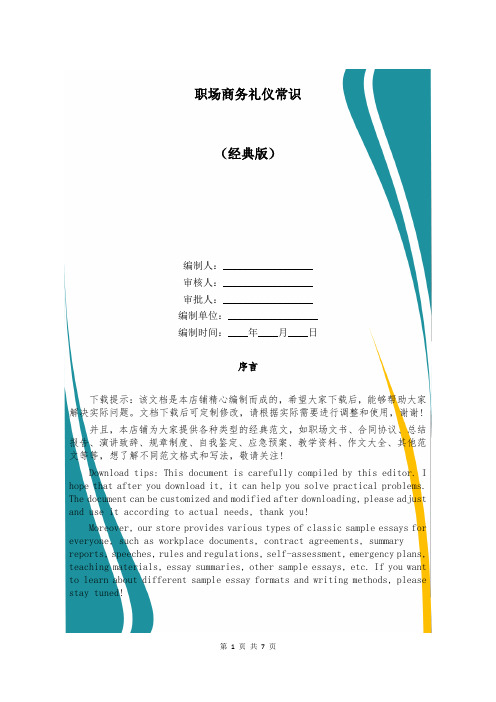
职场商务礼仪常识(经典版)编制人:__________________审核人:__________________审批人:__________________编制单位:__________________编制时间:____年____月____日序言下载提示:该文档是本店铺精心编制而成的,希望大家下载后,能够帮助大家解决实际问题。
文档下载后可定制修改,请根据实际需要进行调整和使用,谢谢!并且,本店铺为大家提供各种类型的经典范文,如职场文书、合同协议、总结报告、演讲致辞、规章制度、自我鉴定、应急预案、教学资料、作文大全、其他范文等等,想了解不同范文格式和写法,敬请关注!Download tips: This document is carefully compiled by this editor. I hope that after you download it, it can help you solve practical problems. The document can be customized and modified after downloading, please adjust and use it according to actual needs, thank you!Moreover, our store provides various types of classic sample essays for everyone, such as workplace documents, contract agreements, summary reports, speeches, rules and regulations, self-assessment, emergency plans, teaching materials, essay summaries, other sample essays, etc. If you want to learn about different sample essay formats and writing methods, please stay tuned!职场商务礼仪常识职场商务礼仪常识职场商务礼仪常识1一、握手:1.握手讲究的是尊者为先,握手时为了表示热情友好,应当稍许用力,但以不握痛对方的手为限度。
商务礼仪知识(精选6篇)
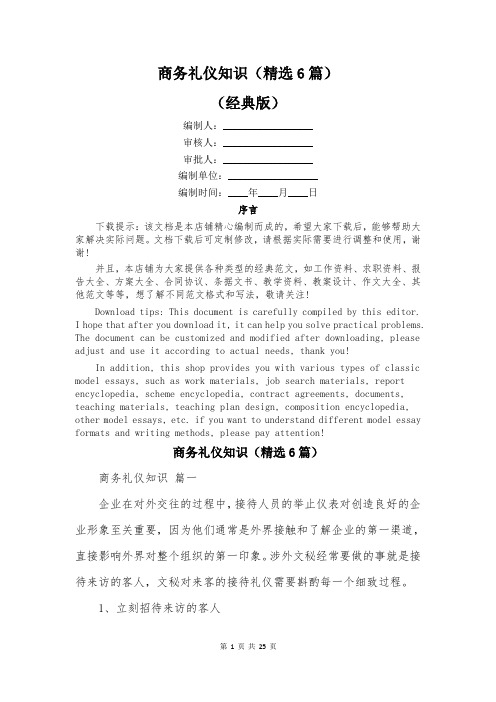
商务礼仪知识(精选6篇)(经典版)编制人:__________________审核人:__________________审批人:__________________编制单位:__________________编制时间:____年____月____日序言下载提示:该文档是本店铺精心编制而成的,希望大家下载后,能够帮助大家解决实际问题。
文档下载后可定制修改,请根据实际需要进行调整和使用,谢谢!并且,本店铺为大家提供各种类型的经典范文,如工作资料、求职资料、报告大全、方案大全、合同协议、条据文书、教学资料、教案设计、作文大全、其他范文等等,想了解不同范文格式和写法,敬请关注!Download tips: This document is carefully compiled by this editor.I hope that after you download it, it can help you solve practical problems. The document can be customized and modified after downloading, please adjust and use it according to actual needs, thank you!In addition, this shop provides you with various types of classic model essays, such as work materials, job search materials, report encyclopedia, scheme encyclopedia, contract agreements, documents, teaching materials, teaching plan design, composition encyclopedia, other model essays, etc. if you want to understand different model essay formats and writing methods, please pay attention!商务礼仪知识(精选6篇)商务礼仪知识篇一企业在对外交往的过程中,接待人员的举止仪表对创造良好的企业形象至关重要,因为他们通常是外界接触和了解企业的第一渠道,直接影响外界对整个组织的第一印象。
商务礼仪知识(优秀6篇)
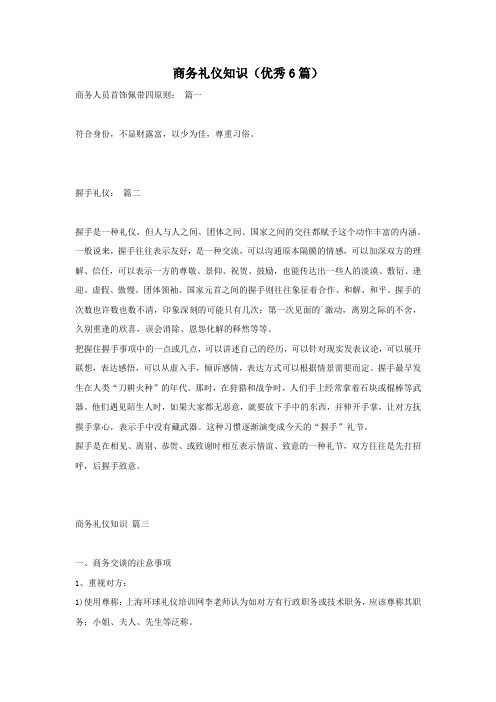
商务礼仪知识(优秀6篇)商务人员首饰佩带四原则:篇一符合身份,不显财露富,以少为佳,尊重习俗。
握手礼仪:篇二握手是一种礼仪,但人与人之间、团体之间、国家之间的交往都赋予这个动作丰富的内涵。
一般说来,握手往往表示友好,是一种交流,可以沟通原本隔膜的情感,可以加深双方的理解、信任,可以表示一方的尊敬、景仰、祝贺、鼓励,也能传达出一些人的淡漠、敷衍、逢迎、虚假、傲慢。
团体领袖、国家元首之间的握手则往往象征着合作、和解、和平。
握手的次数也许数也数不清,印象深刻的可能只有几次:第一次见面的`激动,离别之际的不舍,久别重逢的欣喜,误会消除、恩怨化解的释然等等。
把握住握手事项中的一点或几点,可以讲述自己的经历,可以针对现实发表议论,可以展开联想,表达感悟,可以从虚入手,倾诉感情,表达方式可以根据情景需要而定。
握手最早发生在人类“刀耕火种”的年代。
那时,在狩猎和战争时,人们手上经常拿着石块或棍棒等武器。
他们遇见陌生人时,如果大家都无恶意,就要放下手中的东西,并伸开手掌,让对方抚摸手掌心,表示手中没有藏武器。
这种习惯逐渐演变成今天的“握手”礼节。
握手是在相见、离别、恭贺、或致谢时相互表示情谊、致意的一种礼节,双方往往是先打招呼,后握手致意。
商务礼仪知识篇三一、商务交谈的注意事项1、重视对方:1)使用尊称:上海环球礼仪培训网李老师认为如对方有行政职务或技术职务,应该尊称其职务;小姐、夫人、先生等泛称。
2)记住对方,如记不住,哪怕点头,也不能张冠李戴。
3)不直言对方缺点。
2、赞美对方:1)善于发现对方的优点。
2)实事求是,不可浮夸,显得虚伪3、注意交谈距离:1)私人距离(家人、恋人…。
.)小于半米2)常规距离(交际距离) 0.5米---1米3)礼仪距离(尊重距离长辈上级。
.) 1.5米---3.5米4)公共距离(陌生人。
.) 3.5米以上4、交谈临近结束:1)无论交谈多入,√★√先别先看表,查时间。
2)如果稍后有事或其它预约,应开始时就向以方说明。
商务社交礼仪常识
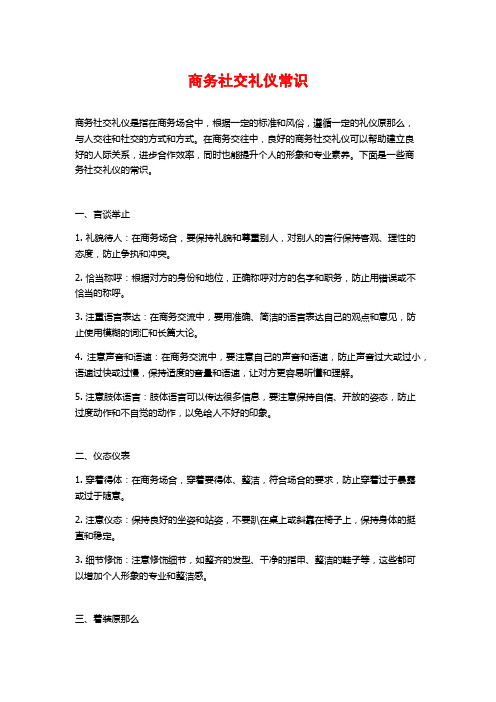
商务社交礼仪常识商务社交礼仪是指在商务场合中,根据一定的标准和风俗,遵循一定的礼仪原那么,与人交往和社交的方式和方式。
在商务交往中,良好的商务社交礼仪可以帮助建立良好的人际关系,进步合作效率,同时也能提升个人的形象和专业素养。
下面是一些商务社交礼仪的常识。
一、言谈举止1. 礼貌待人:在商务场合,要保持礼貌和尊重别人,对别人的言行保持客观、理性的态度,防止争执和冲突。
2. 恰当称呼:根据对方的身份和地位,正确称呼对方的名字和职务,防止用错误或不恰当的称呼。
3. 注重语言表达:在商务交流中,要用准确、简洁的语言表达自己的观点和意见,防止使用模糊的词汇和长篇大论。
4. 注意声音和语速:在商务交流中,要注意自己的声音和语速,防止声音过大或过小,语速过快或过慢,保持适度的音量和语速,让对方更容易听懂和理解。
5. 注意肢体语言:肢体语言可以传达很多信息,要注意保持自信、开放的姿态,防止过度动作和不自觉的动作,以免给人不好的印象。
二、仪态仪表1. 穿着得体:在商务场合,穿着要得体、整洁,符合场合的要求,防止穿着过于暴露或过于随意。
2. 注意仪态:保持良好的坐姿和站姿,不要趴在桌上或斜靠在椅子上,保持身体的挺直和稳定。
3. 细节修饰:注意修饰细节,如整齐的发型、干净的指甲、整洁的鞋子等,这些都可以增加个人形象的专业和整洁感。
三、着装原那么1. 注意场合:根据不同的商务场合,选择适宜的服装。
正式场合应穿着正式西装和皮鞋,非正式场合可以根据需要选择更休闲的服装。
2. 颜色搭配:颜色搭配要合理,防止过于艳丽或过于暗淡的色彩,选择合适自己肤色和场合的服装和配饰。
3. 注意整体风格:保持整体风格的一致,防止过度张扬和过于保守,选择合适自己身材和年龄的服装和风格。
四、餐桌礼仪1. 知道根本用餐礼仪:理解根本的用餐礼仪,如正确使用刀叉、使用餐巾、用餐姿势等。
2. 用餐时注意谈话:在用餐时,要注意谈话的内容和方式,不要在吃东西时大声喧哗或议论不适当的话题。
商务交谈礼仪常识
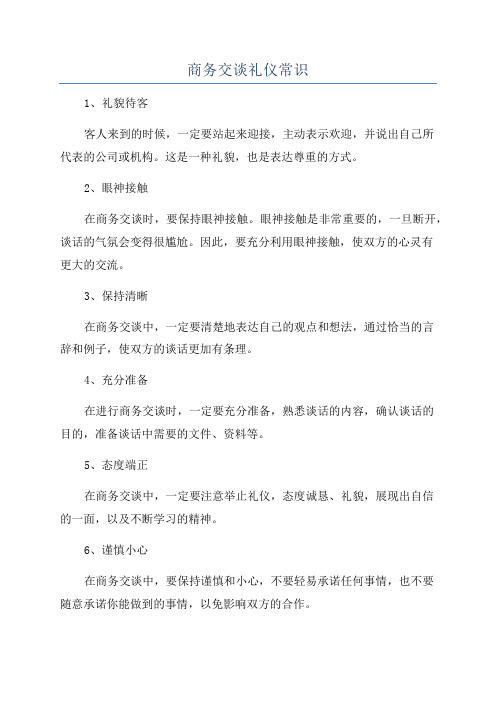
商务交谈礼仪常识
1、礼貌待客
客人来到的时候,一定要站起来迎接,主动表示欢迎,并说出自己所
代表的公司或机构。
这是一种礼貌,也是表达尊重的方式。
2、眼神接触
在商务交谈时,要保持眼神接触。
眼神接触是非常重要的,一旦断开,谈话的气氛会变得很尴尬。
因此,要充分利用眼神接触,使双方的心灵有
更大的交流。
3、保持清晰
在商务交谈中,一定要清楚地表达自己的观点和想法,通过恰当的言
辞和例子,使双方的谈话更加有条理。
4、充分准备
在进行商务交谈时,一定要充分准备,熟悉谈话的内容,确认谈话的
目的,准备谈话中需要的文件、资料等。
5、态度端正
在商务交谈中,一定要注意举止礼仪,态度诚恳、礼貌,展现出自信
的一面,以及不断学习的精神。
6、谨慎小心
在商务交谈中,要保持谨慎和小心,不要轻易承诺任何事情,也不要
随意承诺你能做到的事情,以免影响双方的合作。
7、及时反馈
在商务交谈中,双方应及时反馈对方的想法和看法,并在必要时采取行动,以表明自己的诚意,减少双方的分歧和误解。
8、对话平和
在商务交谈中,双方应该尊重对方,尊重对方的观点,并通过友好的交流,调整对方的情绪,增进彼此的谅解。
- 1、下载文档前请自行甄别文档内容的完整性,平台不提供额外的编辑、内容补充、找答案等附加服务。
- 2、"仅部分预览"的文档,不可在线预览部分如存在完整性等问题,可反馈申请退款(可完整预览的文档不适用该条件!)。
- 3、如文档侵犯您的权益,请联系客服反馈,我们会尽快为您处理(人工客服工作时间:9:00-18:30)。
Informal Meeting
❖Chair’s responsibilities
▪ Make the purpose and time span of the meeting clear, and preparation of documents
▪ ensure the meeting is kept as short and effective as possible
▪ Normal business hours are Monday – Friday 8:30am-5:00pm and Saturday 9:00am-12:30pm.
Dinner party etiquette
❖ Some details prior to commencement of the dinner party :
▪ The customary greeting is the bow. If you are greeted with a bow, return with a bow as low as the one you received.
▪ The business card should be given after the bow.
Meeting etiquettes in different cultures
Indonesia
Russia
Brazil
Meeting etiquettes
Japan
New Zealand
Meeting etiquettes in different cultures
❖ Brazil
▪ Make appointments at least two weeks in advance.
▪ Upon invitation (inform the host of your decision) ▪ Being time conscious (arrive on time or early) ▪ On arrival (take off your hat and overcoat) ▪ Seating (take the seat assigned by the host) ▪ Getting ready to eat (do not begin to eat or drink
Meeting etiquettes in different cultures
❖ New Zealand
▪ Always be on time or early for all appointments. Punctuality is part of the culture.
▪ Maintain a reserved, formal demeanor, especially when first meeting someone.
Meeting etiquettes in different cultures
❖ New Zealand
▪ Always be on time or early for all appointments. Punctuality is part of the culture.
▪ Maintain a reserved, formal demeanor, especially when first meeting someone.
▪ appoint someone to record the proceedings and the major decisions or action points
Informal Meeting
❖Meeting manners
▪ If the results of the meeting have an effect on others who were not present, inform them
▪ When speaking, be brief and ensure what you say is relevant
▪ Always address the chair unless it is clear that others are not doing so
▪ Keep the meeting information confidential
❖ Russia
▪ Be on time to all business appointments.
▪ Do not expect an apology from a late Russian, and do not demonstrate any kind of attitude if your business appointments begin one or two hours late.
Manners are different all across the world – respect them and be interested.
Introduction ❖What Is Business Etiquette?
Rules that allow us to interact in a civilized fashion
▪ Punctuality is a must.
Formal Meeting
❖ Preparations
▪ Handouts should be delivered at least three days prior to the meeting
▪ Dress well and arrive in good time. ▪ Always remember to switch off mobile
Introduction
Etiquette is much more than just knowing where the soup spoon goes.
Etiquette means behaving yourself a little better than is absolutely essential.
▪ Be prepared to commit long term resources (both in time and money) toward establishing strong relationships in Brazil.
▪ Some regions have a casualness about both time and work.
Code of behavior that is grounded in common sense and cultural norms
Manners matter in the workplace
Good Etiquette
Poor Etiquette
Contents
1
Meeting etiquettes
▪ Social events are more relaxed. It is acceptable for foreigners to be 15 to 30 minutes late.
▪ Russians are known as great "sitters" during negotiations, this demonstrates their tremendous patience.
Introduction
❖The two goals of negotiations: 1.Creating strong deals 2.Building good relationship
❖Etiquette plays an important role in helping achieve the goals.
▪ When discussions are under way it is good business etiquette to allow more senior figures to contribute first.
Formal Meeting
❖Meeting discussion
▪ Never interrupt anyone. Note what has been said and return to it later with the chair’s permission
Etiquette in Business Negotiation
Group 1:董闫帅琪 袁森 茹国宇 陈宇航
Introduction
❖What is Etiquette?
▪ Etiquette is a code of behavior that delineates expectations for social behavior according to contemporary conventional norms within a society, social class, or group. The French word étiquette, literally signifying a tag or label, first appeared in English around 1750. ——Wikipedia Nhomakorabeaphone.
Formal Meeting
❖Meeting opening
▪ If there is an established seating pattern, accept it. If you are unsure, ask.
▪ Acknowledge any introductions or opening remarks with a brief recognition of the chair and other participants.
▪ Never stand with your back to an elderly person or a high ranking official.
